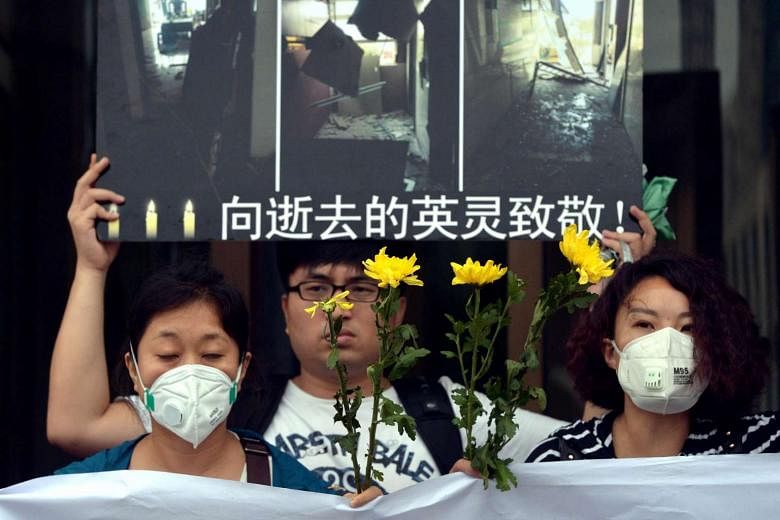The silence from the Chinese authorities might have been deafening in the days after two huge explosions ripped through an industrial zone in Tianjin city but, in cyberspace, it was a cacophony of chatter.
Chinese social media went into a frenzy from the get-go - a sharp contrast to the muted reaction from official media. The northern port city's residents shared their experiences, pictures and terrifying videos from the Aug 12 blasts and fires that followed, which spread rapidly online throughout the night.
In the week after the explosions at a hazardous chemicals storage facility, social media users also began digging in earnest into the cause of the accident that has killed 114 people, even as officials have been criticised for their lack of transparency and slow release of information.
The hashtag "Tanggu explosion truth" was trending at the top of China's Twitter-like Sina Weibo microblog site in the hours after the blasts as netizens engaged in a debate about the official death toll, its cause and the after-effects of the blasts. Tanggu is the district in Tianjin where the explosions occurred.
From pointing out that the warehouse broke the law by being too close to a residential block to noting that the amount of toxic sodium cyanide stored was over what the firm was legally allowed to hold, netizens have poked and prodded.
This was as Tianjin officials were unable to provide details on the nature and quantity of the dangerous chemicals kept in the warehouse days after the blasts.
It was also social media and independent magazine Caijing that highlighted the murky ownership of the warehouse owner, Ruihai International Logistics.
It took a week before the real identities of Ruihai's owners were revealed by the official Xinhua news agency on Wednesday. They include the son of Tianjin port's former police chief who had tapped his political links to help the firm obtain the necessary permits and pass inspections.
The United Nations' top expert on human rights and hazardous materials criticised China yesterday for a "tragic" lack of transparency on the Tianjin blasts. UN Special Rapporteur Baskut Tuncak said more timely information could have "perhaps even prevented this disaster".
Experts say social media is filling in the gaps left by official narratives of the Tianjin disaster, with the fast-moving nature of the incident's aftermath making the government look slow, incompetent and corrupt.
While the authorities have tried to influence public opinion - in some cases by censoring local media reports - the Internet has again proved itself to be the main public square for lively discussion and debate.
Journalism professor Zhan Jiang from the Beijing Foreign Studies University said social media has placed a huge amount of pressure on the authorities to be more open with information, especially as China has an extremely developed Internet that allows news to spread quickly.
Beijing-based sociologist Hu Xingdou said: "Traditional media is controlled by the authorities but social media is independent and in the hands of the people, so it has a watchdog function."
Last Friday, the government said it shut down more than 360 social media accounts and 50 websites for spreading rumours.
Still, discussion about the fatal explosions has raged on in cyberspace.
Prof Hu said rumours spread only when there is incomplete access to information.
"Sites and accounts should be closed only if they are malicious and intended to cause mass chaos, not if people are simply trying to piece information together to find out the truth," he added.

